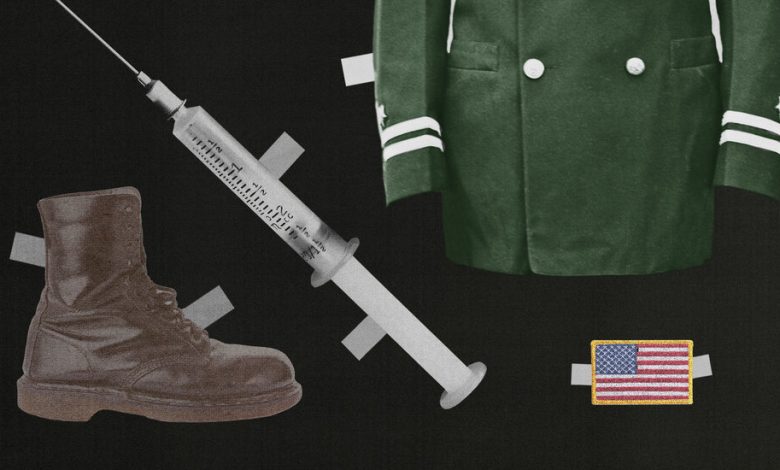An Unvaccinated Military Puts Our National Security at Risk

Ninety-eight percent of the U.S. military is vaccinated against Covid-19. That success is due, in large part, to a summer of 2021 decision by Secretary of Defense Lloyd Austin that mandatory vaccination was “necessary to protect the force and defend the American people.”
That mandate is about to be lifted. While Covid vaccines have never enjoyed universal support, lately the vaccine requirement has become a political lightning rod, with congressional Republicans threatening to hold up the annual National Defense Authorization Act unless it’s rolled back.
The N.D.A.A. is must-pass annual legislation: It authorizes and updates the military’s annual spending for policies and programs and ensures that our national military apparatus is evolving with the threat landscape. Fearing the failure of an essential bill, Democrats in the House, where I once served, agreed to repeal the requirement in exchange for the N.D.A.A.’s passage.
As the defense secretary’s former senior adviser on Covid, I helped craft the mandate and believe it is a mistake to lift it. Congress and the White House should honor the military’s decades-old practice of mandatory vaccinations — principally because it keeps those in uniform safe. Our elected officials shouldn’t turn our military into pawns in the Covid culture war, complicating the decisions of combat commanders and damaging American national security.
Before World War II, more American military personnel died from infectious disease than from combat. But over the past 70 years, mandatory shots in the U.S. military have become commonplace, akin to push-ups, saluting and uniforms: just part of the job. U.S. service members receive several vaccines, including some that are foreign to the general public.
One of my most vivid memories from Army boot camp is balancing on one leg, lowering my fatigues and receiving what’s referred to as the peanut butter shot. The thick, brownish Bicillin shot guards against various bacteria and illnesses like yaws, strep and rheumatic fever. It’s very painful, yet every year, tens of thousands of recruits stand dutifully on a single leg and get the jab.
The same goes for myriad other vaccines that the general public doesn’t necessarily need or want but the military requires to safeguard its personnel. “Mandatory vaccinations are familiar to all of our service members,” wrote Secretary Austin in his 2021 Covid memorandum, “and mission-critical inoculation is almost as old as the U.S. military itself.”
Vaccinations rarely received pushback before, because service members recognize that their work places them in singular danger. Wars are often fought in locations without nearby intensive care units or hospitals. If the military can take any steps to reduce hospitalizations, it does. That logic applied to the Covid-19 vaccine: Better an inexpensive shot at home than the cost, time and risk of an exfiltration abroad. For instance, in 2020 the military evacuated three coronavirus patients from Afghanistan to Germany. That required the use of a C-17 Globemaster III, which held the three patients in specialized pods and was staffed by over 20 service members at a cost of millions.
Pentagon leadership has never viewed the mandatory vaccine program in grandiose moral terms; it is a matter of national security. The U.S. military exists to fight wars and to deter our enemies from starting them, and we do everything we can to make war fighting more effective and do so without complaint.
It’s telling that the howls of protest about the Covid vaccine mandate are coming not from frustrated senior military commanders but from Republican members of Congress. Had those politicians consulted senior uniformed personnel, I believe they would have heard an easy case in the mandate’s favor: simplifying decision making and improving military readiness. Absent a mandate, commanders will have to choose. Do they account for vaccination status when considering deployments? Or do they deploy an unvaccinated service member and bear the incremental risk of an evacuation because of illness?
Mandate opponents have argued that the policy harmed military retention, pointing to roughly 8,000 service members discharged for refusing the vaccination. But that figure accounts for only 0.5 percent of active-duty personnel — a small fraction of ordinary annual attrition — and it ignores the military’s half-decade record of hitting its retention goals, including during 2021 and 2022.
Critics also blame the vaccine mandate for hurting recruitment. Recruitment is a long-simmering challenge for the military, a side effect of decades of war and an attractive civilian labor market, among other factors. The idea that removing the mandate will lead to a rush at recruiting depots seems implausible, and the mandate’s opponents have been silent on other measures — like higher military pay — that would help make the military more attractive. But even if we grant the recruitment argument, the military shouldn’t weaken standards of fitness, health and conduct for the sake of numbers.
I was a Congress member once, and I know political posturing when I see it. But this isn’t some forgettable segment on Fox News or MSNBC, and it’s distinct from the general public’s debate about mandates. If unvaccinated civilians fall ill and lack private health insurance, taxpayers may wind up paying the cost of their treatment; if service members fall ill while deployed, the price could be paid in the blood of their fellow troops. The civilian problem is a frustration; as a veteran, I find the military issue intolerable.
That’s why many veterans who don’t support a Covid-19 vaccine mandate for the general public do support one for the armed services — myself included. The military operates at a remove from civilian life, and with good reason: Our work is dangerous and demands an organization fit for battle. I wouldn’t require that my civilian neighbors get the peanut butter shot, but I know its value for troops, the same way I accept the military’s stringent rules about conduct, fitness, speech and dress. Those codes do what the Covid-19 vaccine mandate does; they ensure the cohesion and preparedness of our fighting forces.
That’s why it’s disturbing to see military vaccine policy turned into partisan hay. By politicizing this issue, Republicans in Congress may earn a small win in the culture war — and weaken our country’s capacity to fight and win actual wars.
Max Rose is an Army combat veteran and former congressman who served as a senior adviser to the secretary of defense.
The Times is committed to publishing a diversity of letters to the editor. We’d like to hear what you think about this or any of our articles. Here are some tips. And here’s our email: [email protected].
Follow The New York Times Opinion section on Facebook, Twitter (@NYTopinion) and Instagram.





